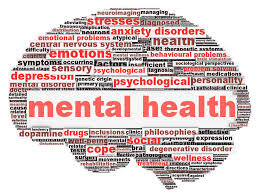Millions in the U.S. and around the world are under stay-at-home orders as officials hope to slow the spread of the coronavirus. But how do those practices affect individuals’ mental health? What are the unique mental health challenges people are facing during the COVID-19 pandemic, and how do they affect health care workers, those living alone and those returning to work, among others?
Psychiatrist Dr. Jessi Gold of Washington University School of Medicine in Saint Louis and PBS NewsHour’s Amna Nawaz answered viewer questions on how to take care of our mental health and cope with things like fear and anxiety during the COVID-19 pandemic on May 6.
What are some tips on how to deal with anxiety from uncertainty?
A major cause of anxiety during the coronavirus pandemic is the uncertainty about what the near future will hold, which can be exacerbated by the prevalence of misinformation about the virus, Gold said.
Gold said the reason why we feel anxiety hearkens back to primal instincts to be aware of our surroundings, and to always be prepared to run from predators.
“It’s really, really normal,” she said. “Everyone is dealing with anxiety.”
Gold recommended everyone stay informed through their favorite, trustworthy, news sources to help alleviate some uncertainty, but to also limit that time in an effort to not get overwhelmed.
“I think you have to stay informed to some degree,” she said.
Anxiety can also come from growing daily to-do lists. Even the midst of all the demands, Gold recommends people always be kind to themselves.
“You’re going to be less productive right now,” she said, urging people to be patient with themselves.
She suggested breaking down big tasks into smaller, more manageable pieces to make them feel less daunting.
Beyond that, Gold said to explore relaxation methods such as meditation, but also said that method does not work for everyone.
“Don’t beat yourself up if it isn’t for you,” she said.
She also recommended activities like exercising and listing some of your favorite things as a way to get away from anxious thoughts.
How do you know when it’s time to seek professional help?
Living through a global health crisis is a new and trying experience for most, and some who have never experienced serious mental health issues may wonder if, and when, they need to seek help.
Gold assured that “it’s okay to always ask for help,” and that no one is going to turn you away for not having enough symptoms.
She also suggests that everyone becomes familiar with the common signs of mental distress:
Sleeping too much, or too little
Eating too much, or too little
Not interacting as much with friends or family
A lack of joy in things you used to like
Low energy
While these aren’t always definite signs, they are indicative of an affected headspace, which may require help from a therapist.
How do we deal with loneliness?
For many people living alone, social distancing has cut off everyday interactions that are critical for mental stability. Gold said she understands this on a personal level since she also lives alone.
“This is the first time it’s been very evident that I live alone,” she said.
Gold recommended everyone should make an effort to reach out to friends or family to maintain social interactions. That could involve just talking, or setting up a game or movie viewing night.
“It actually feels more like work … but it’s worth doing in the end,” she said.
She also suggested that, in this moment of isolation, that we can find the things we truly enjoy doing by ourselves.
PBS NewsHour viewers also weighed in with ways they have been coping and finding joy in things they enjoy, such as bike rides, working out, learning to meditate, knitting and watching new or favorite TV shows.
“Find what coping skills work for you,” she said.
What are some resources available during COVID-19?
As the pandemic continues, many doctors are concerned about the wave of mental health issues caused by extensive social isolation and anxiety about the virus. Gold said it’s important to first break down the distinction between mental and physical health.
“I think we like to separate things, but I don’t know if that necessarily helps us,” she said.
Many physical issues, like a lack of protective gear and helping to treat those with COVID-19, directly affect a person’s mental health. Gold said that means we’re probably already seeing the effects of poor mental health on a portion of the population.
Gold listed a few helpful mental health resources that are available during this pandemic.
To find a therapist, Gold recommended Psychologytoday.com.
For members of the Trans community, Gold recommended calling or texting the Trans Lifeline.
For the emergencies, Gold recommended the Crisis Lifeline, or the National Suicide Prevention Lifeline.
For frontline workers in particular, she recommended Project Parachute or Emotional PPE.
Gold said online services like Teladoc are helpful, but are limiting in many ways, even for the therapist.
“It’s really hard for me, I think I’m really used to the human experience,” she said. “But it’s a lot better than nothing,” particularly during this pandemic, where social distancing has been key to curbing the spread of the virus.
While telemedicine can be cost effective for some, Gold said many people do not have easy access to either the internet or a device in order to use these services.
“This is not something we can just assume people can use,” she said.
View the whole interview here: https://youtu.be/iS7z1XX-e5Y
